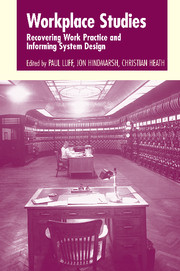Preface
Published online by Cambridge University Press: 05 May 2010
Summary
It is widely recognised that new technology has had a profound impact on our working lives. It is argued that the so-called digital revolution has transformed the ways in which we communicate with each other, how we store and handle information, the ways in which we classify people and events, how we calculate products and value, and how we market goods and services. Social scientists discuss new forms of organisation, the transformation of contemporary culture and, among many other things, globalisation and emergence of the network society. Despite our attempts to remain optimistic in the face of the inevitable pursuit for more advanced and sophisticated technologies, often at the expense of employment, there is a growing recognition that complex systems may not necessarily enhance work practice, human relations or even efficiency within organisations. Poor performance, mishaps and technological failures are encouraging those within industry to begin to reconsider the advantages of technology for technology's sake, and to recognise that there is more to the design and deployment of complex systems than simply identifying new functionalities for computer systems. There is also a corresponding change within academia, a recognition that for all our discussion of technology we actually know very little as to how ordinary people in their daily working lives go about using the tools of their trades.
Over the past few years, there have been a number of research projects concerned with the ways in which new tools and technologies feature in everyday organisational conduct. These investigations have come to be known as ‘workplace studies’.
- Type
- Chapter
- Information
- Workplace StudiesRecovering Work Practice and Informing System Design, pp. xii - xviPublisher: Cambridge University PressPrint publication year: 2000

